EHE1100 Assignment 2: Reading Assessment Analysis Report
VerifiedAdded on 2022/10/06
|14
|2258
|24
Report
AI Summary
This report presents a comprehensive analysis of a reading assessment, focusing on the application of the 'Big 5' reading components: phonemic awareness, phonics, fluency, vocabulary, and comprehension. It explores underpinning theories like constructivism and cognitivism in literacy planning and teaching. The report includes a reading analysis template, assessing a student's skills and linking them to the Australian Curriculum. A diagnostic assessment is performed, with a reading behavior analysis sheet. The report also provides justification, referencing research literature and curriculum standards to support the findings and identifies learning priorities. The report examines decoding strategies, strengths, and areas for improvement, and the importance of assessment for learning is highlighted. The analysis covers various aspects of reading, including the student's performance, the strategies used, and the areas where further development is needed, offering practical insights for educators and students alike.
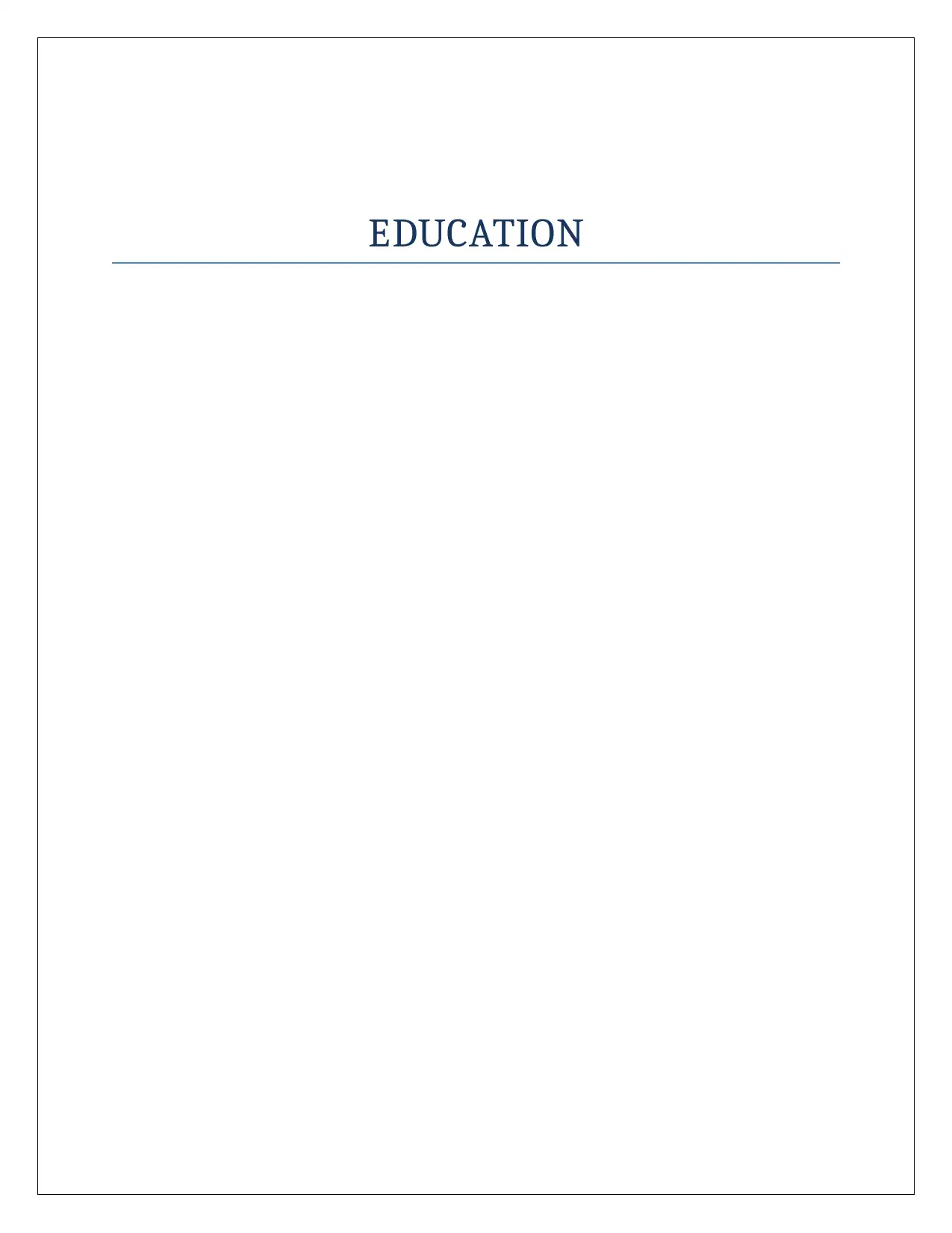
EDUCATION
Paraphrase This Document
Need a fresh take? Get an instant paraphrase of this document with our AI Paraphraser
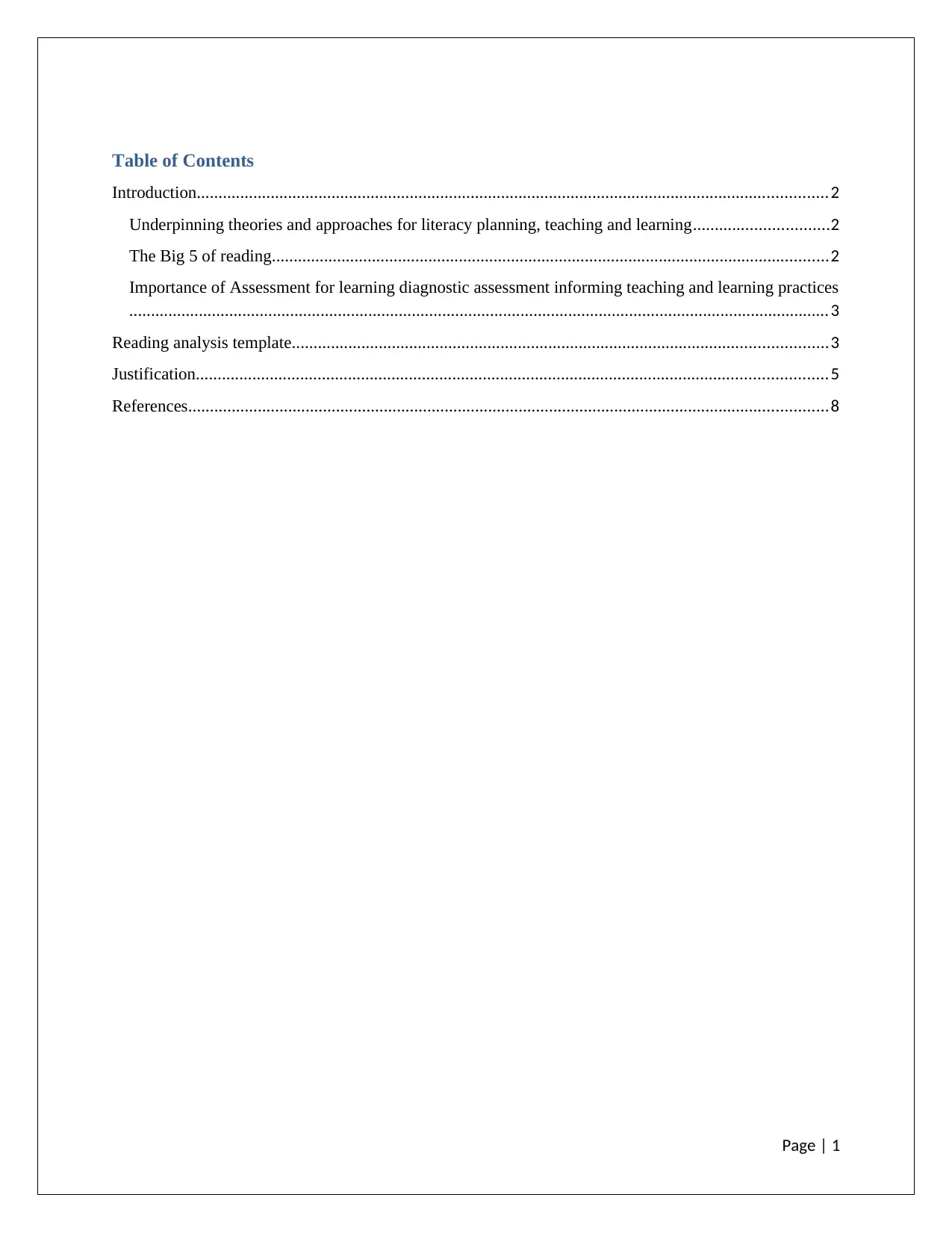
Table of Contents
Introduction.................................................................................................................................................2
Underpinning theories and approaches for literacy planning, teaching and learning...............................2
The Big 5 of reading................................................................................................................................2
Importance of Assessment for learning diagnostic assessment informing teaching and learning practices
.................................................................................................................................................................3
Reading analysis template...........................................................................................................................3
Justification.................................................................................................................................................5
References...................................................................................................................................................8
Page | 1
Introduction.................................................................................................................................................2
Underpinning theories and approaches for literacy planning, teaching and learning...............................2
The Big 5 of reading................................................................................................................................2
Importance of Assessment for learning diagnostic assessment informing teaching and learning practices
.................................................................................................................................................................3
Reading analysis template...........................................................................................................................3
Justification.................................................................................................................................................5
References...................................................................................................................................................8
Page | 1
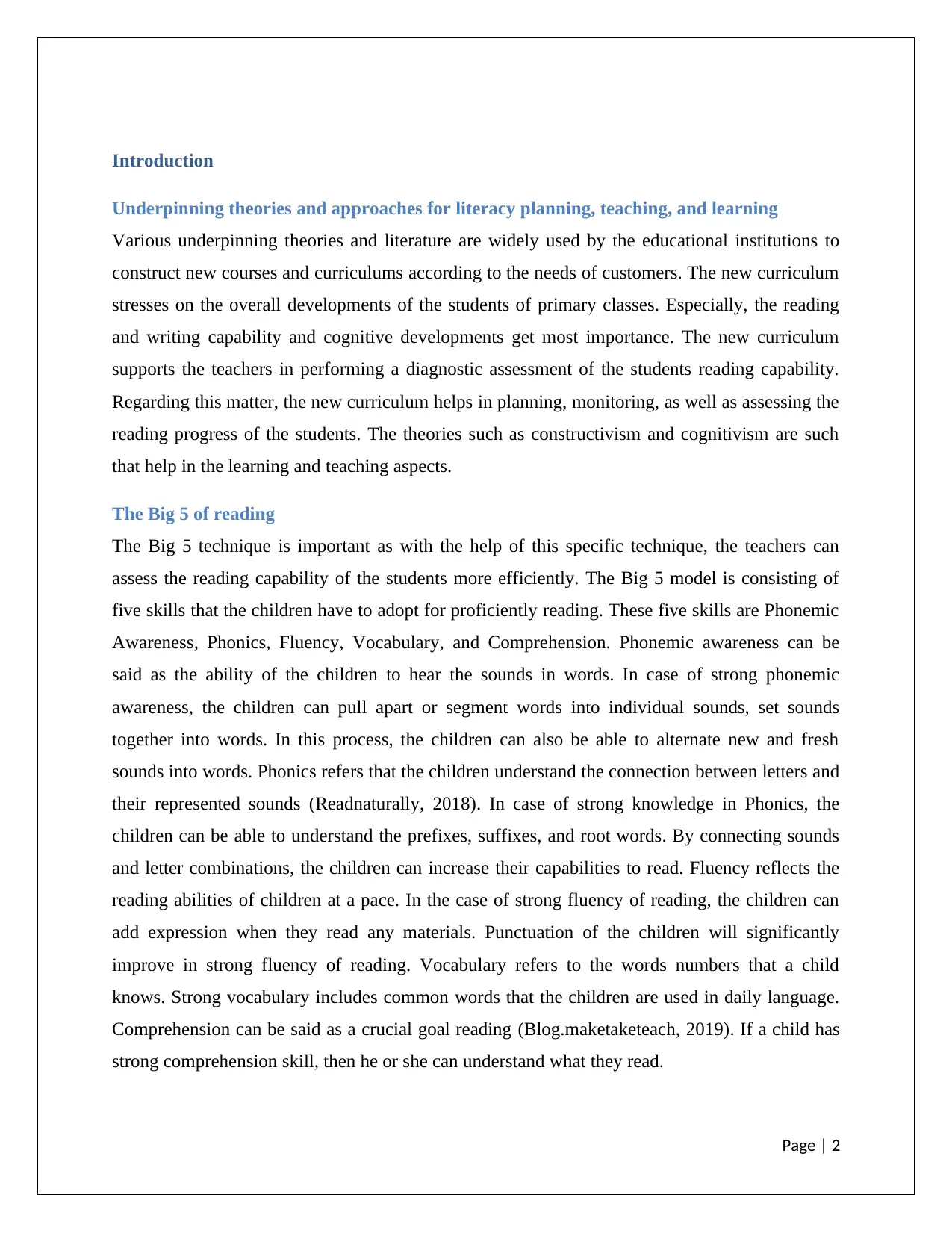
Introduction
Underpinning theories and approaches for literacy planning, teaching, and learning
Various underpinning theories and literature are widely used by the educational institutions to
construct new courses and curriculums according to the needs of customers. The new curriculum
stresses on the overall developments of the students of primary classes. Especially, the reading
and writing capability and cognitive developments get most importance. The new curriculum
supports the teachers in performing a diagnostic assessment of the students reading capability.
Regarding this matter, the new curriculum helps in planning, monitoring, as well as assessing the
reading progress of the students. The theories such as constructivism and cognitivism are such
that help in the learning and teaching aspects.
The Big 5 of reading
The Big 5 technique is important as with the help of this specific technique, the teachers can
assess the reading capability of the students more efficiently. The Big 5 model is consisting of
five skills that the children have to adopt for proficiently reading. These five skills are Phonemic
Awareness, Phonics, Fluency, Vocabulary, and Comprehension. Phonemic awareness can be
said as the ability of the children to hear the sounds in words. In case of strong phonemic
awareness, the children can pull apart or segment words into individual sounds, set sounds
together into words. In this process, the children can also be able to alternate new and fresh
sounds into words. Phonics refers that the children understand the connection between letters and
their represented sounds (Readnaturally, 2018). In case of strong knowledge in Phonics, the
children can be able to understand the prefixes, suffixes, and root words. By connecting sounds
and letter combinations, the children can increase their capabilities to read. Fluency reflects the
reading abilities of children at a pace. In the case of strong fluency of reading, the children can
add expression when they read any materials. Punctuation of the children will significantly
improve in strong fluency of reading. Vocabulary refers to the words numbers that a child
knows. Strong vocabulary includes common words that the children are used in daily language.
Comprehension can be said as a crucial goal reading (Blog.maketaketeach, 2019). If a child has
strong comprehension skill, then he or she can understand what they read.
Page | 2
Underpinning theories and approaches for literacy planning, teaching, and learning
Various underpinning theories and literature are widely used by the educational institutions to
construct new courses and curriculums according to the needs of customers. The new curriculum
stresses on the overall developments of the students of primary classes. Especially, the reading
and writing capability and cognitive developments get most importance. The new curriculum
supports the teachers in performing a diagnostic assessment of the students reading capability.
Regarding this matter, the new curriculum helps in planning, monitoring, as well as assessing the
reading progress of the students. The theories such as constructivism and cognitivism are such
that help in the learning and teaching aspects.
The Big 5 of reading
The Big 5 technique is important as with the help of this specific technique, the teachers can
assess the reading capability of the students more efficiently. The Big 5 model is consisting of
five skills that the children have to adopt for proficiently reading. These five skills are Phonemic
Awareness, Phonics, Fluency, Vocabulary, and Comprehension. Phonemic awareness can be
said as the ability of the children to hear the sounds in words. In case of strong phonemic
awareness, the children can pull apart or segment words into individual sounds, set sounds
together into words. In this process, the children can also be able to alternate new and fresh
sounds into words. Phonics refers that the children understand the connection between letters and
their represented sounds (Readnaturally, 2018). In case of strong knowledge in Phonics, the
children can be able to understand the prefixes, suffixes, and root words. By connecting sounds
and letter combinations, the children can increase their capabilities to read. Fluency reflects the
reading abilities of children at a pace. In the case of strong fluency of reading, the children can
add expression when they read any materials. Punctuation of the children will significantly
improve in strong fluency of reading. Vocabulary refers to the words numbers that a child
knows. Strong vocabulary includes common words that the children are used in daily language.
Comprehension can be said as a crucial goal reading (Blog.maketaketeach, 2019). If a child has
strong comprehension skill, then he or she can understand what they read.
Page | 2
⊘ This is a preview!⊘
Do you want full access?
Subscribe today to unlock all pages.

Trusted by 1+ million students worldwide
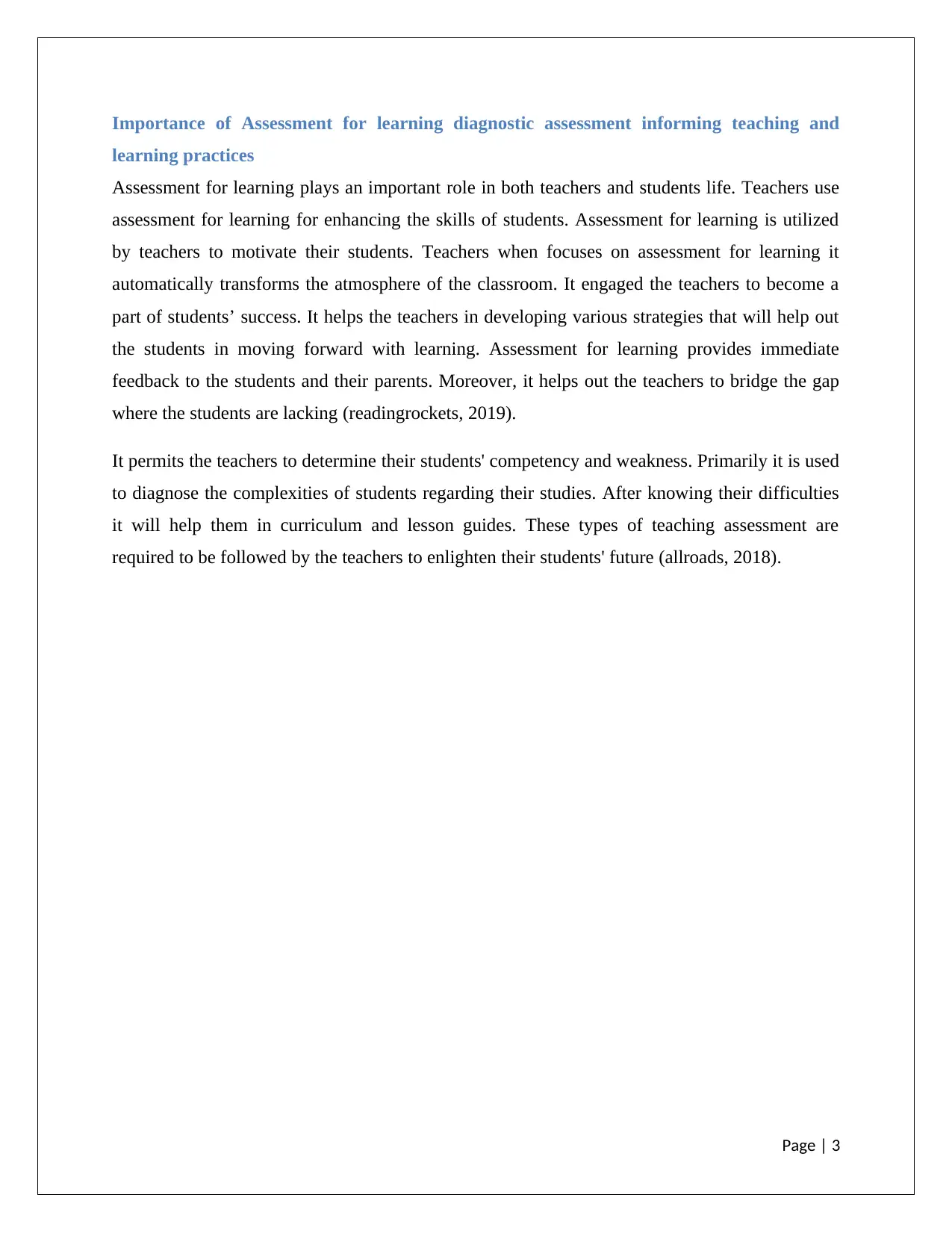
Importance of Assessment for learning diagnostic assessment informing teaching and
learning practices
Assessment for learning plays an important role in both teachers and students life. Teachers use
assessment for learning for enhancing the skills of students. Assessment for learning is utilized
by teachers to motivate their students. Teachers when focuses on assessment for learning it
automatically transforms the atmosphere of the classroom. It engaged the teachers to become a
part of students’ success. It helps the teachers in developing various strategies that will help out
the students in moving forward with learning. Assessment for learning provides immediate
feedback to the students and their parents. Moreover, it helps out the teachers to bridge the gap
where the students are lacking (readingrockets, 2019).
It permits the teachers to determine their students' competency and weakness. Primarily it is used
to diagnose the complexities of students regarding their studies. After knowing their difficulties
it will help them in curriculum and lesson guides. These types of teaching assessment are
required to be followed by the teachers to enlighten their students' future (allroads, 2018).
Page | 3
learning practices
Assessment for learning plays an important role in both teachers and students life. Teachers use
assessment for learning for enhancing the skills of students. Assessment for learning is utilized
by teachers to motivate their students. Teachers when focuses on assessment for learning it
automatically transforms the atmosphere of the classroom. It engaged the teachers to become a
part of students’ success. It helps the teachers in developing various strategies that will help out
the students in moving forward with learning. Assessment for learning provides immediate
feedback to the students and their parents. Moreover, it helps out the teachers to bridge the gap
where the students are lacking (readingrockets, 2019).
It permits the teachers to determine their students' competency and weakness. Primarily it is used
to diagnose the complexities of students regarding their studies. After knowing their difficulties
it will help them in curriculum and lesson guides. These types of teaching assessment are
required to be followed by the teachers to enlighten their students' future (allroads, 2018).
Page | 3
Paraphrase This Document
Need a fresh take? Get an instant paraphrase of this document with our AI Paraphraser
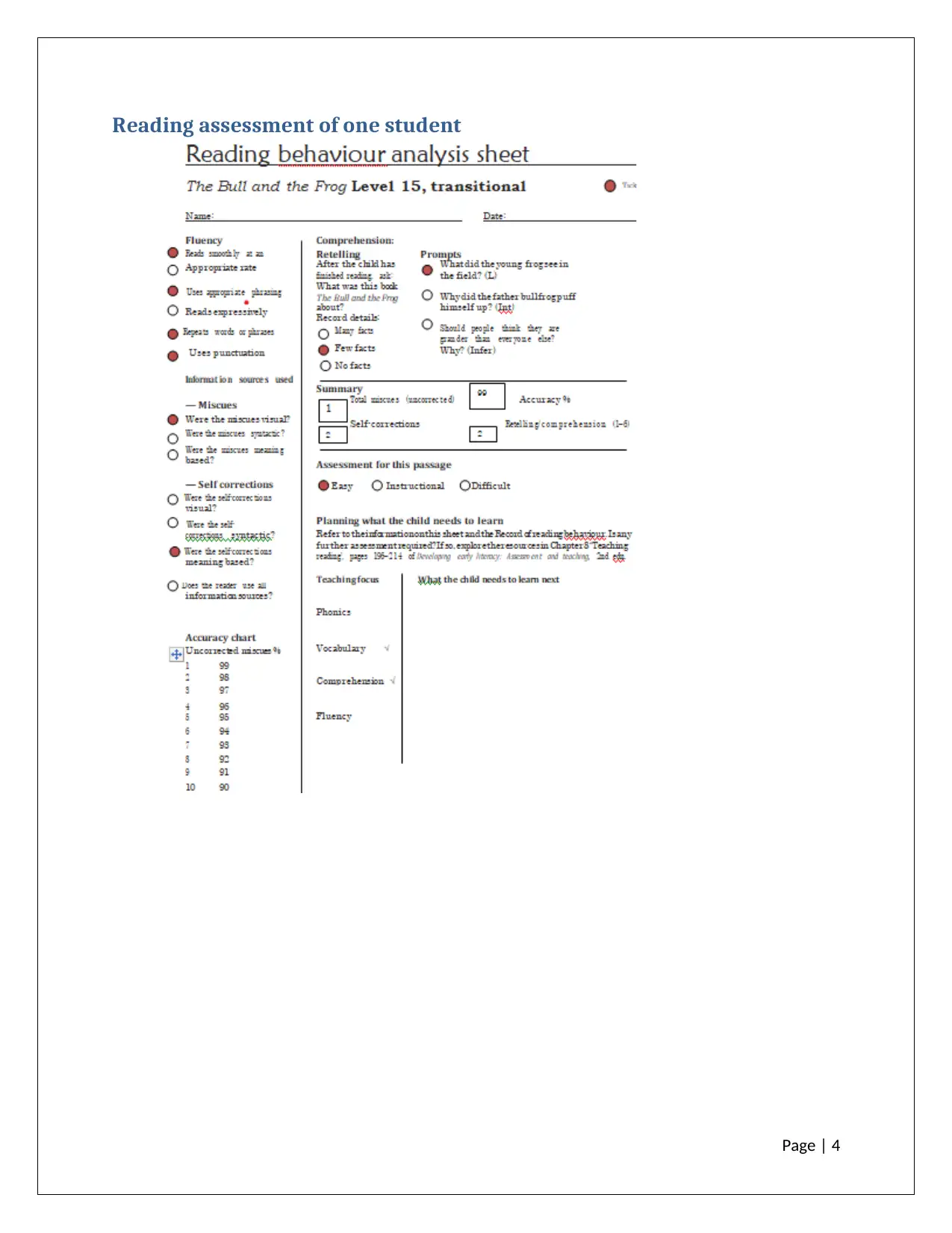
Reading assessment of one student
Page | 4
Page | 4
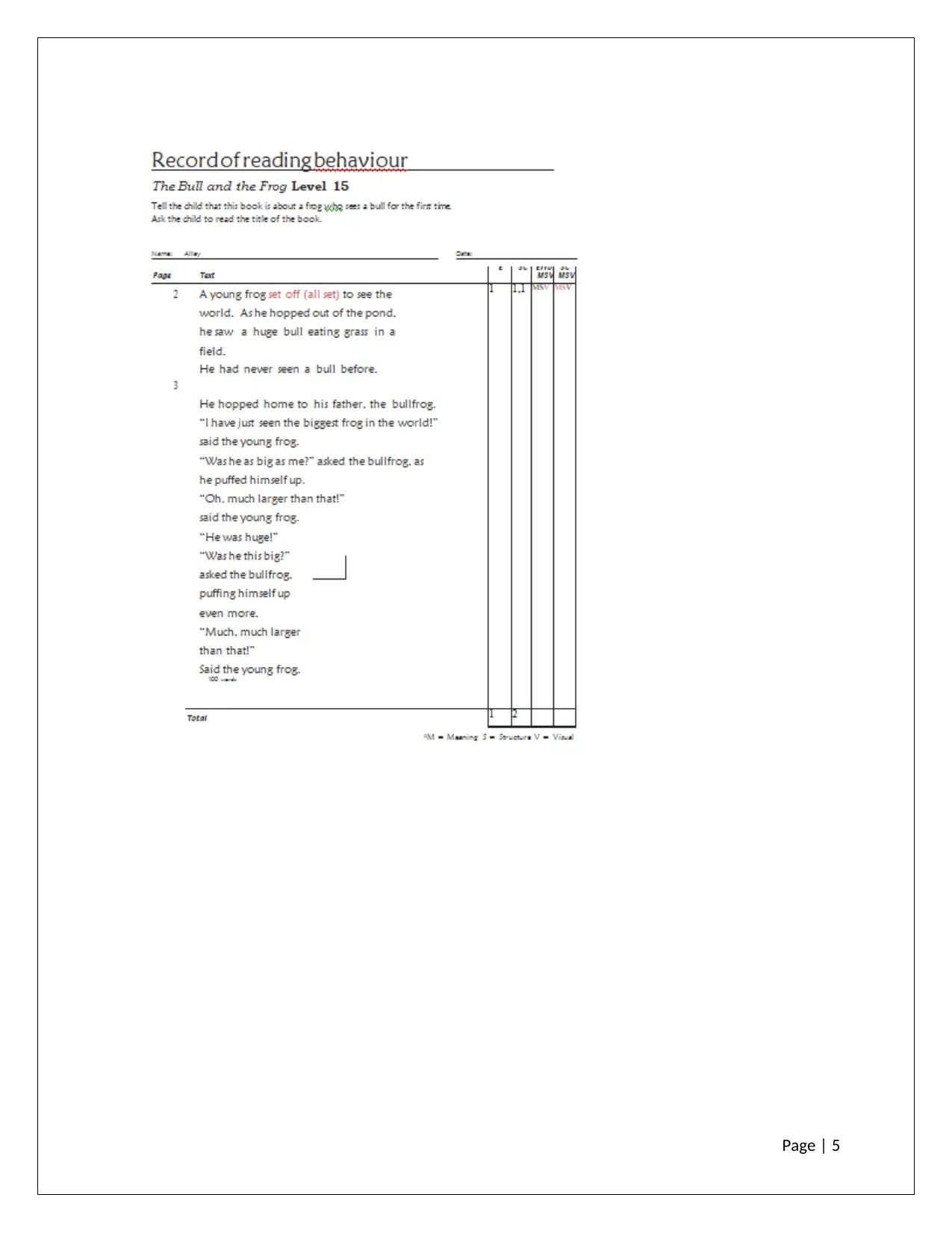
Page | 5
⊘ This is a preview!⊘
Do you want full access?
Subscribe today to unlock all pages.

Trusted by 1+ million students worldwide
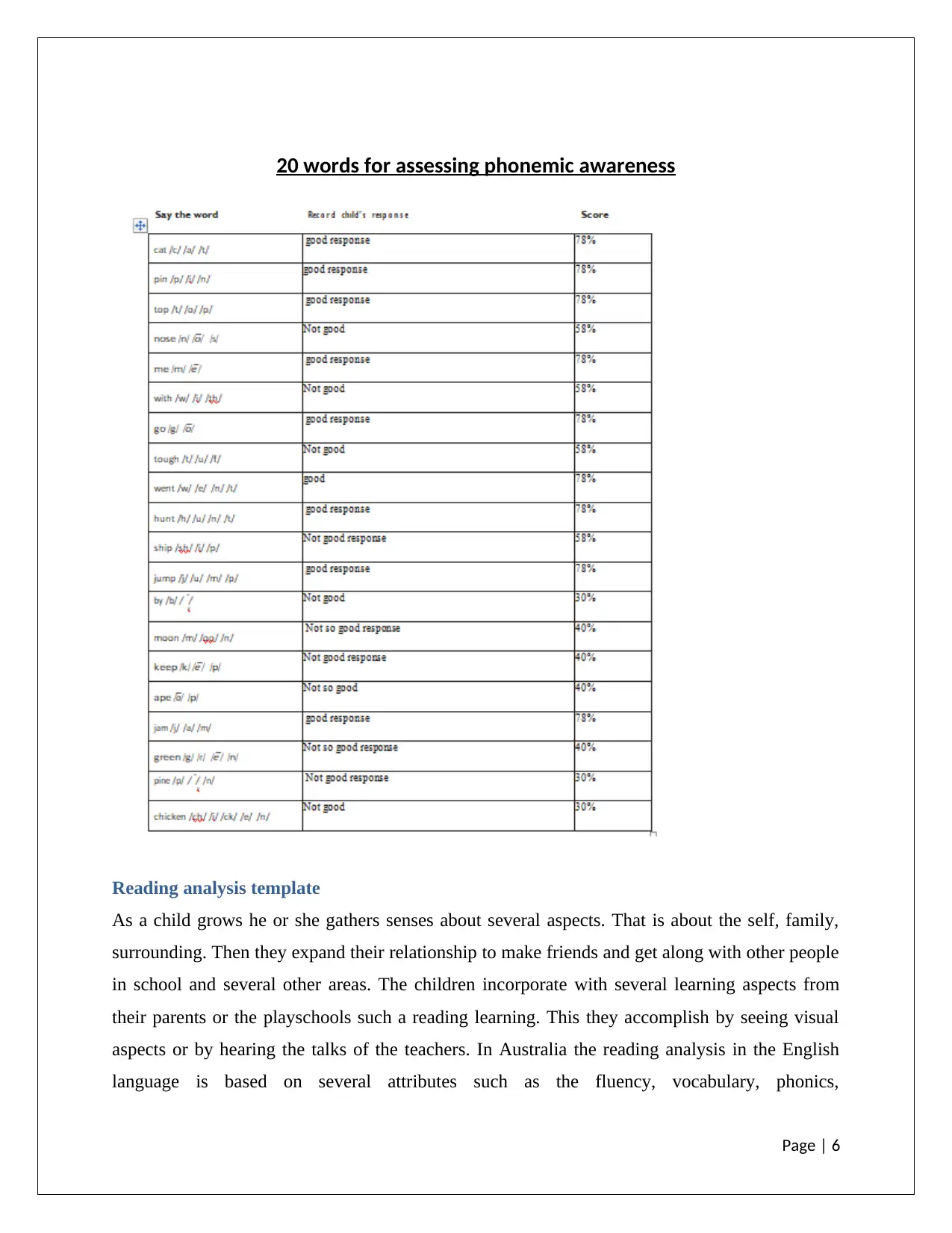
20 words for assessing phonemic awareness
Reading analysis template
As a child grows he or she gathers senses about several aspects. That is about the self, family,
surrounding. Then they expand their relationship to make friends and get along with other people
in school and several other areas. The children incorporate with several learning aspects from
their parents or the playschools such a reading learning. This they accomplish by seeing visual
aspects or by hearing the talks of the teachers. In Australia the reading analysis in the English
language is based on several attributes such as the fluency, vocabulary, phonics,
Page | 6
Reading analysis template
As a child grows he or she gathers senses about several aspects. That is about the self, family,
surrounding. Then they expand their relationship to make friends and get along with other people
in school and several other areas. The children incorporate with several learning aspects from
their parents or the playschools such a reading learning. This they accomplish by seeing visual
aspects or by hearing the talks of the teachers. In Australia the reading analysis in the English
language is based on several attributes such as the fluency, vocabulary, phonics,
Page | 6
Paraphrase This Document
Need a fresh take? Get an instant paraphrase of this document with our AI Paraphraser
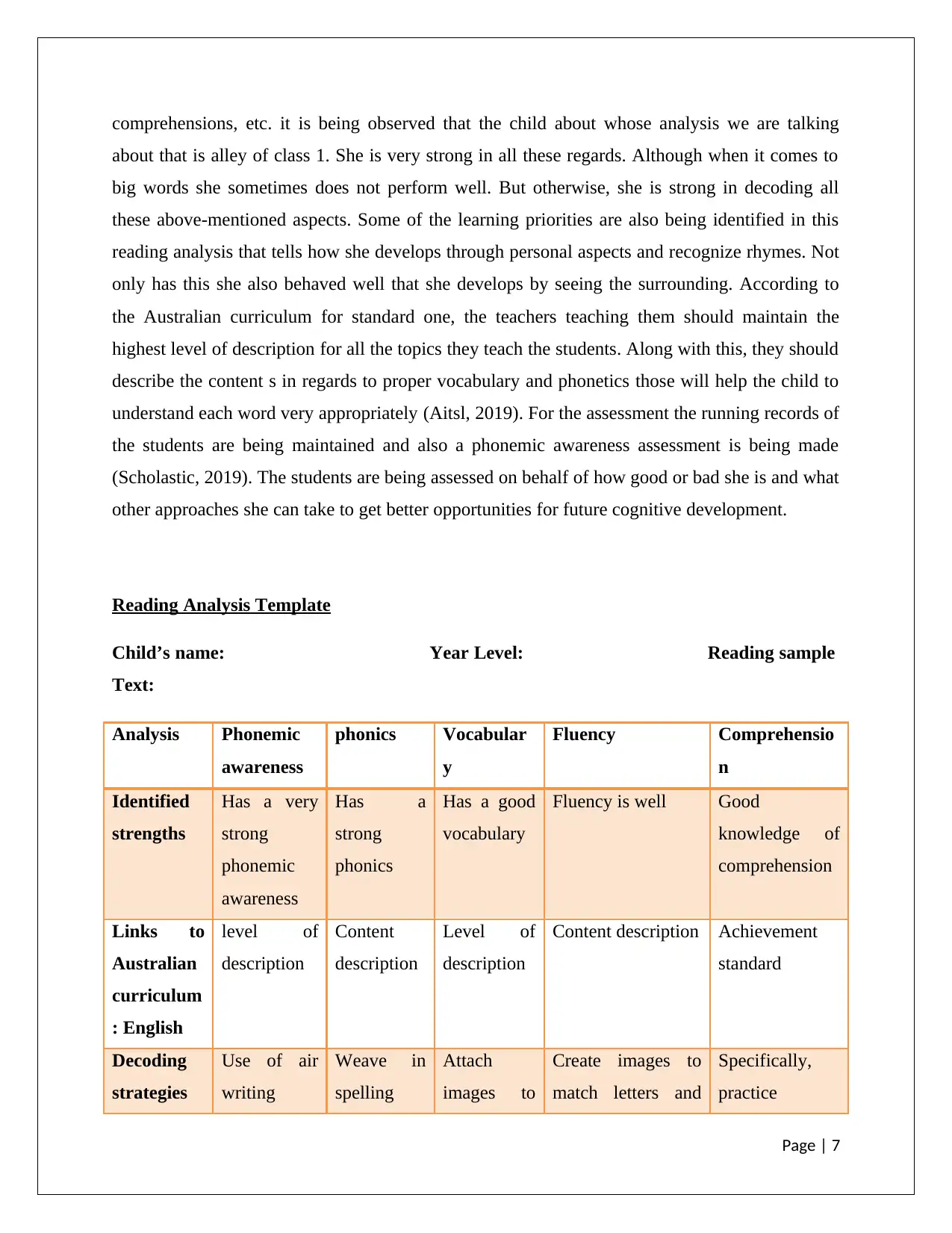
comprehensions, etc. it is being observed that the child about whose analysis we are talking
about that is alley of class 1. She is very strong in all these regards. Although when it comes to
big words she sometimes does not perform well. But otherwise, she is strong in decoding all
these above-mentioned aspects. Some of the learning priorities are also being identified in this
reading analysis that tells how she develops through personal aspects and recognize rhymes. Not
only has this she also behaved well that she develops by seeing the surrounding. According to
the Australian curriculum for standard one, the teachers teaching them should maintain the
highest level of description for all the topics they teach the students. Along with this, they should
describe the content s in regards to proper vocabulary and phonetics those will help the child to
understand each word very appropriately (Aitsl, 2019). For the assessment the running records of
the students are being maintained and also a phonemic awareness assessment is being made
(Scholastic, 2019). The students are being assessed on behalf of how good or bad she is and what
other approaches she can take to get better opportunities for future cognitive development.
Reading Analysis Template
Child’s name: Year Level: Reading sample
Text:
Analysis Phonemic
awareness
phonics Vocabular
y
Fluency Comprehensio
n
Identified
strengths
Has a very
strong
phonemic
awareness
Has a
strong
phonics
Has a good
vocabulary
Fluency is well Good
knowledge of
comprehension
Links to
Australian
curriculum
: English
level of
description
Content
description
Level of
description
Content description Achievement
standard
Decoding
strategies
Use of air
writing
Weave in
spelling
Attach
images to
Create images to
match letters and
Specifically,
practice
Page | 7
about that is alley of class 1. She is very strong in all these regards. Although when it comes to
big words she sometimes does not perform well. But otherwise, she is strong in decoding all
these above-mentioned aspects. Some of the learning priorities are also being identified in this
reading analysis that tells how she develops through personal aspects and recognize rhymes. Not
only has this she also behaved well that she develops by seeing the surrounding. According to
the Australian curriculum for standard one, the teachers teaching them should maintain the
highest level of description for all the topics they teach the students. Along with this, they should
describe the content s in regards to proper vocabulary and phonetics those will help the child to
understand each word very appropriately (Aitsl, 2019). For the assessment the running records of
the students are being maintained and also a phonemic awareness assessment is being made
(Scholastic, 2019). The students are being assessed on behalf of how good or bad she is and what
other approaches she can take to get better opportunities for future cognitive development.
Reading Analysis Template
Child’s name: Year Level: Reading sample
Text:
Analysis Phonemic
awareness
phonics Vocabular
y
Fluency Comprehensio
n
Identified
strengths
Has a very
strong
phonemic
awareness
Has a
strong
phonics
Has a good
vocabulary
Fluency is well Good
knowledge of
comprehension
Links to
Australian
curriculum
: English
level of
description
Content
description
Level of
description
Content description Achievement
standard
Decoding
strategies
Use of air
writing
Weave in
spelling
Attach
images to
Create images to
match letters and
Specifically,
practice
Page | 7
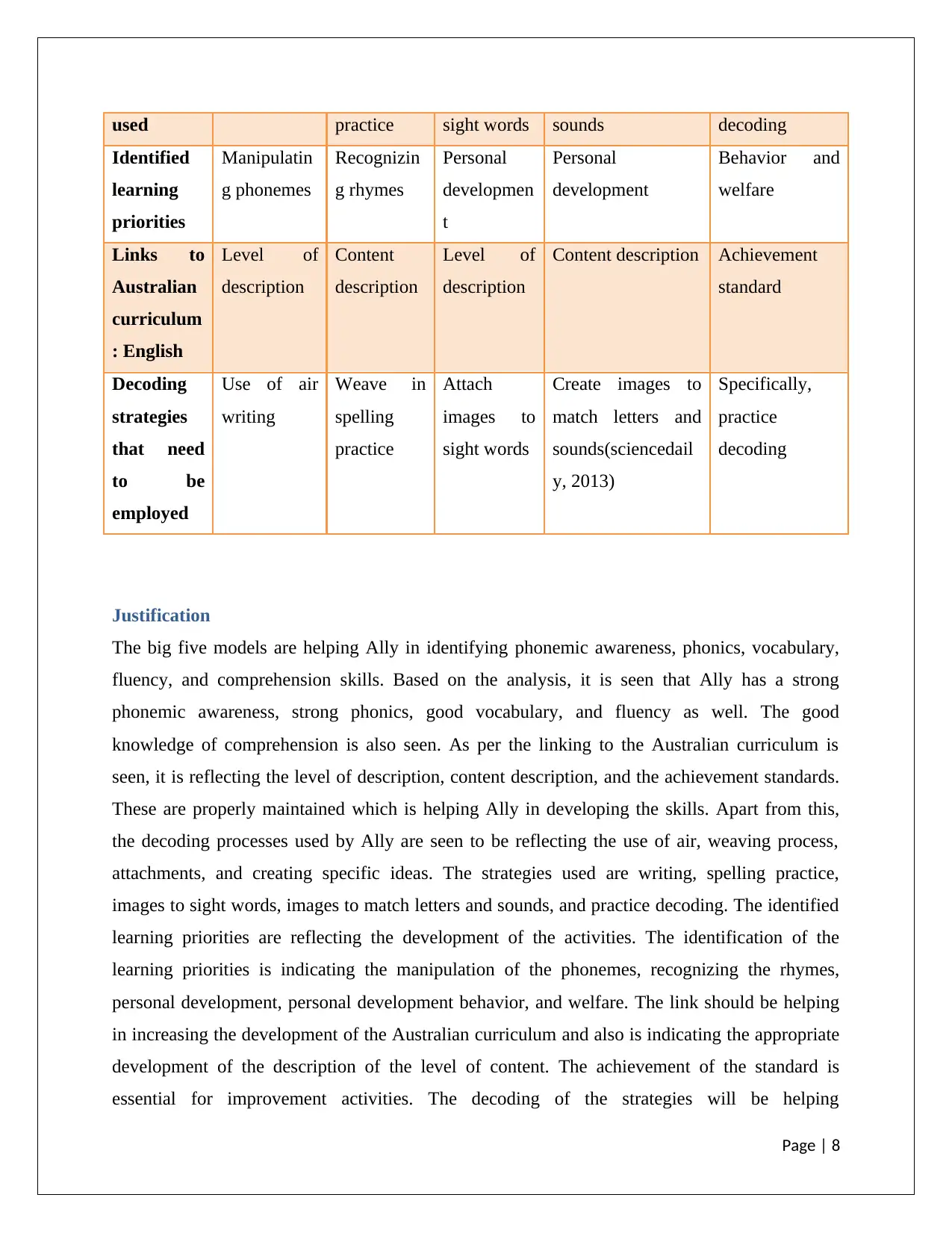
used practice sight words sounds decoding
Identified
learning
priorities
Manipulatin
g phonemes
Recognizin
g rhymes
Personal
developmen
t
Personal
development
Behavior and
welfare
Links to
Australian
curriculum
: English
Level of
description
Content
description
Level of
description
Content description Achievement
standard
Decoding
strategies
that need
to be
employed
Use of air
writing
Weave in
spelling
practice
Attach
images to
sight words
Create images to
match letters and
sounds(sciencedail
y, 2013)
Specifically,
practice
decoding
Justification
The big five models are helping Ally in identifying phonemic awareness, phonics, vocabulary,
fluency, and comprehension skills. Based on the analysis, it is seen that Ally has a strong
phonemic awareness, strong phonics, good vocabulary, and fluency as well. The good
knowledge of comprehension is also seen. As per the linking to the Australian curriculum is
seen, it is reflecting the level of description, content description, and the achievement standards.
These are properly maintained which is helping Ally in developing the skills. Apart from this,
the decoding processes used by Ally are seen to be reflecting the use of air, weaving process,
attachments, and creating specific ideas. The strategies used are writing, spelling practice,
images to sight words, images to match letters and sounds, and practice decoding. The identified
learning priorities are reflecting the development of the activities. The identification of the
learning priorities is indicating the manipulation of the phonemes, recognizing the rhymes,
personal development, personal development behavior, and welfare. The link should be helping
in increasing the development of the Australian curriculum and also is indicating the appropriate
development of the description of the level of content. The achievement of the standard is
essential for improvement activities. The decoding of the strategies will be helping
Page | 8
Identified
learning
priorities
Manipulatin
g phonemes
Recognizin
g rhymes
Personal
developmen
t
Personal
development
Behavior and
welfare
Links to
Australian
curriculum
: English
Level of
description
Content
description
Level of
description
Content description Achievement
standard
Decoding
strategies
that need
to be
employed
Use of air
writing
Weave in
spelling
practice
Attach
images to
sight words
Create images to
match letters and
sounds(sciencedail
y, 2013)
Specifically,
practice
decoding
Justification
The big five models are helping Ally in identifying phonemic awareness, phonics, vocabulary,
fluency, and comprehension skills. Based on the analysis, it is seen that Ally has a strong
phonemic awareness, strong phonics, good vocabulary, and fluency as well. The good
knowledge of comprehension is also seen. As per the linking to the Australian curriculum is
seen, it is reflecting the level of description, content description, and the achievement standards.
These are properly maintained which is helping Ally in developing the skills. Apart from this,
the decoding processes used by Ally are seen to be reflecting the use of air, weaving process,
attachments, and creating specific ideas. The strategies used are writing, spelling practice,
images to sight words, images to match letters and sounds, and practice decoding. The identified
learning priorities are reflecting the development of the activities. The identification of the
learning priorities is indicating the manipulation of the phonemes, recognizing the rhymes,
personal development, personal development behavior, and welfare. The link should be helping
in increasing the development of the Australian curriculum and also is indicating the appropriate
development of the description of the level of content. The achievement of the standard is
essential for improvement activities. The decoding of the strategies will be helping
Page | 8
⊘ This is a preview!⊘
Do you want full access?
Subscribe today to unlock all pages.

Trusted by 1+ million students worldwide
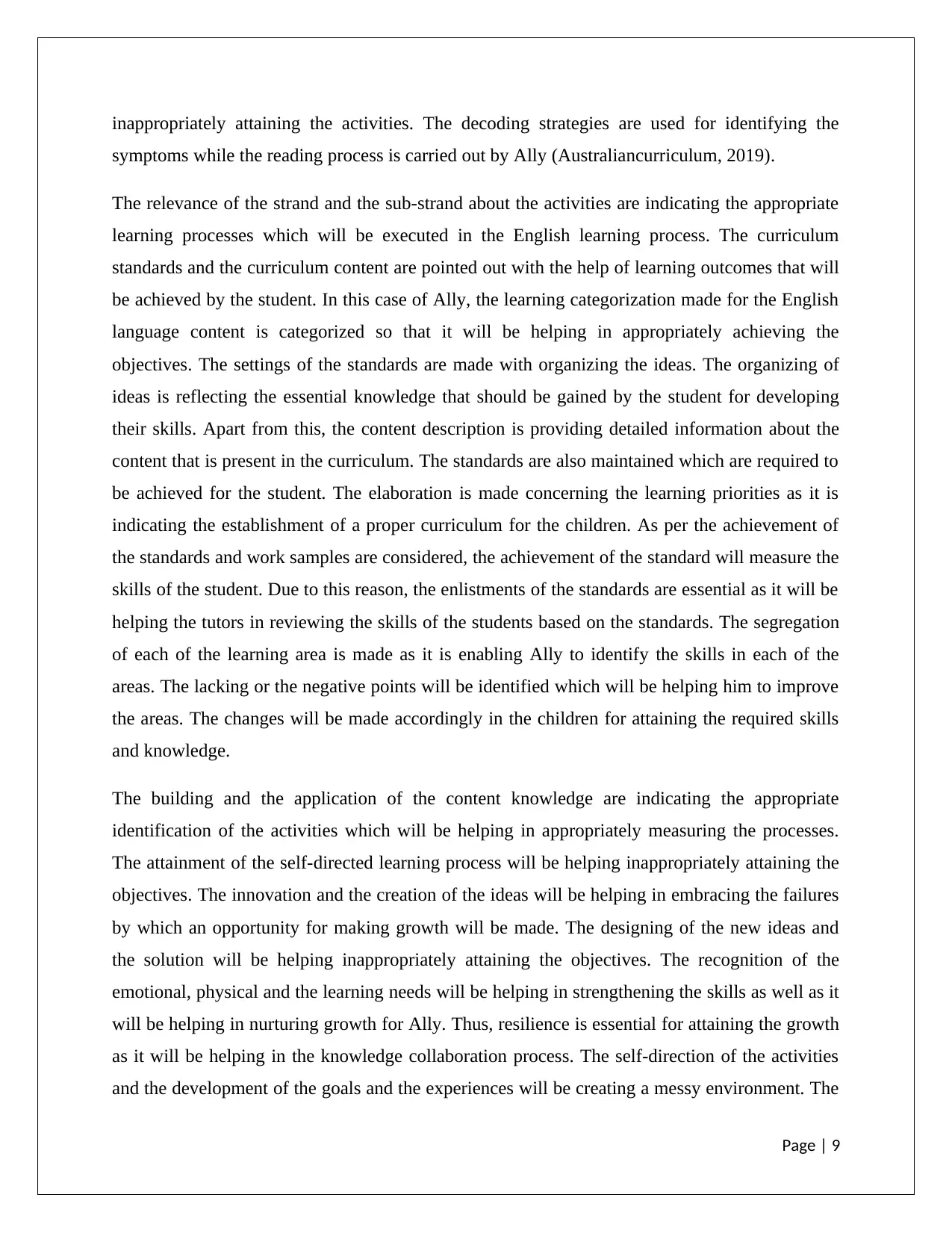
inappropriately attaining the activities. The decoding strategies are used for identifying the
symptoms while the reading process is carried out by Ally (Australiancurriculum, 2019).
The relevance of the strand and the sub-strand about the activities are indicating the appropriate
learning processes which will be executed in the English learning process. The curriculum
standards and the curriculum content are pointed out with the help of learning outcomes that will
be achieved by the student. In this case of Ally, the learning categorization made for the English
language content is categorized so that it will be helping in appropriately achieving the
objectives. The settings of the standards are made with organizing the ideas. The organizing of
ideas is reflecting the essential knowledge that should be gained by the student for developing
their skills. Apart from this, the content description is providing detailed information about the
content that is present in the curriculum. The standards are also maintained which are required to
be achieved for the student. The elaboration is made concerning the learning priorities as it is
indicating the establishment of a proper curriculum for the children. As per the achievement of
the standards and work samples are considered, the achievement of the standard will measure the
skills of the student. Due to this reason, the enlistments of the standards are essential as it will be
helping the tutors in reviewing the skills of the students based on the standards. The segregation
of each of the learning area is made as it is enabling Ally to identify the skills in each of the
areas. The lacking or the negative points will be identified which will be helping him to improve
the areas. The changes will be made accordingly in the children for attaining the required skills
and knowledge.
The building and the application of the content knowledge are indicating the appropriate
identification of the activities which will be helping in appropriately measuring the processes.
The attainment of the self-directed learning process will be helping inappropriately attaining the
objectives. The innovation and the creation of the ideas will be helping in embracing the failures
by which an opportunity for making growth will be made. The designing of the new ideas and
the solution will be helping inappropriately attaining the objectives. The recognition of the
emotional, physical and the learning needs will be helping in strengthening the skills as well as it
will be helping in nurturing growth for Ally. Thus, resilience is essential for attaining the growth
as it will be helping in the knowledge collaboration process. The self-direction of the activities
and the development of the goals and the experiences will be creating a messy environment. The
Page | 9
symptoms while the reading process is carried out by Ally (Australiancurriculum, 2019).
The relevance of the strand and the sub-strand about the activities are indicating the appropriate
learning processes which will be executed in the English learning process. The curriculum
standards and the curriculum content are pointed out with the help of learning outcomes that will
be achieved by the student. In this case of Ally, the learning categorization made for the English
language content is categorized so that it will be helping in appropriately achieving the
objectives. The settings of the standards are made with organizing the ideas. The organizing of
ideas is reflecting the essential knowledge that should be gained by the student for developing
their skills. Apart from this, the content description is providing detailed information about the
content that is present in the curriculum. The standards are also maintained which are required to
be achieved for the student. The elaboration is made concerning the learning priorities as it is
indicating the establishment of a proper curriculum for the children. As per the achievement of
the standards and work samples are considered, the achievement of the standard will measure the
skills of the student. Due to this reason, the enlistments of the standards are essential as it will be
helping the tutors in reviewing the skills of the students based on the standards. The segregation
of each of the learning area is made as it is enabling Ally to identify the skills in each of the
areas. The lacking or the negative points will be identified which will be helping him to improve
the areas. The changes will be made accordingly in the children for attaining the required skills
and knowledge.
The building and the application of the content knowledge are indicating the appropriate
identification of the activities which will be helping in appropriately measuring the processes.
The attainment of the self-directed learning process will be helping inappropriately attaining the
objectives. The innovation and the creation of the ideas will be helping in embracing the failures
by which an opportunity for making growth will be made. The designing of the new ideas and
the solution will be helping inappropriately attaining the objectives. The recognition of the
emotional, physical and the learning needs will be helping in strengthening the skills as well as it
will be helping in nurturing growth for Ally. Thus, resilience is essential for attaining the growth
as it will be helping in the knowledge collaboration process. The self-direction of the activities
and the development of the goals and the experiences will be creating a messy environment. The
Page | 9
Paraphrase This Document
Need a fresh take? Get an instant paraphrase of this document with our AI Paraphraser
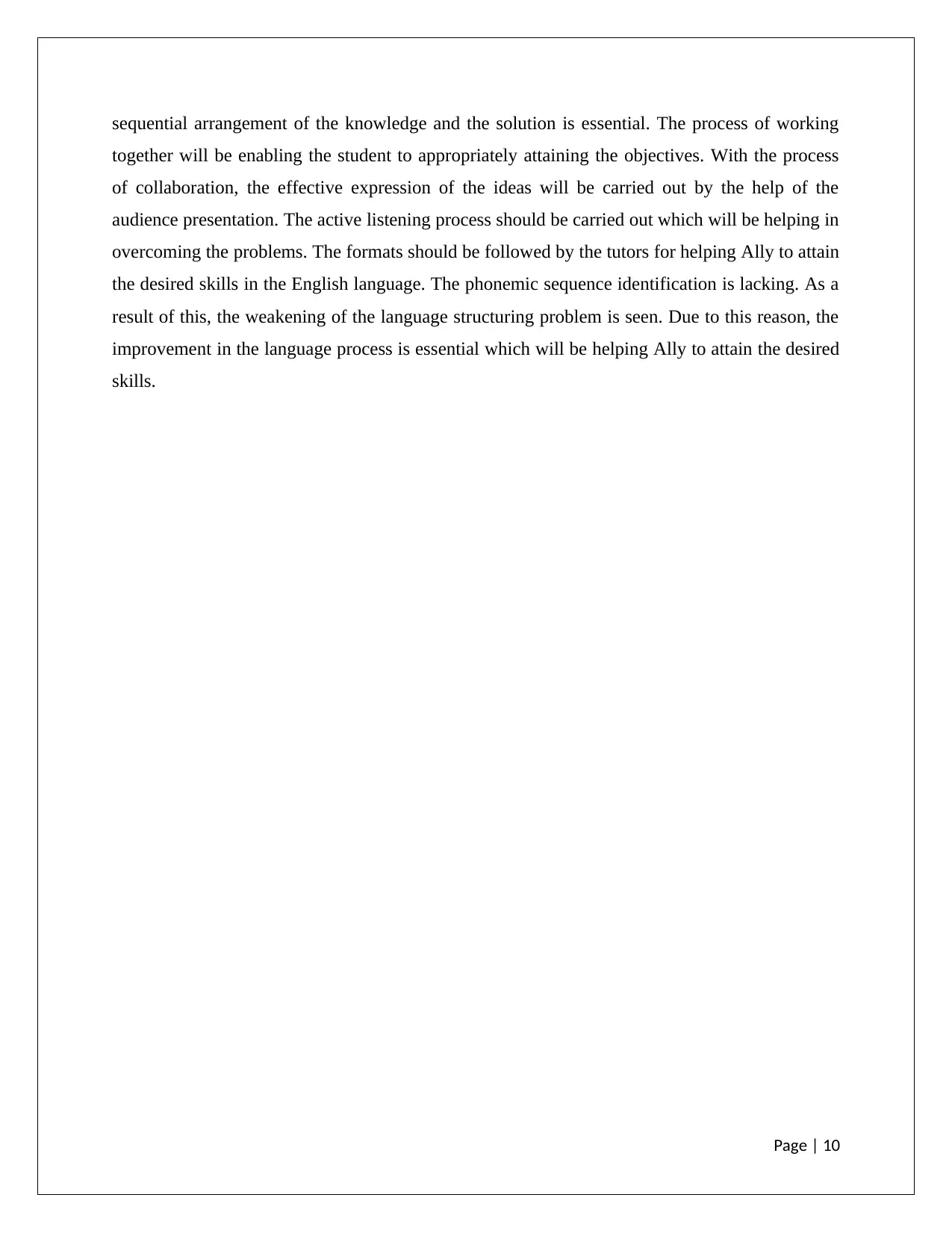
sequential arrangement of the knowledge and the solution is essential. The process of working
together will be enabling the student to appropriately attaining the objectives. With the process
of collaboration, the effective expression of the ideas will be carried out by the help of the
audience presentation. The active listening process should be carried out which will be helping in
overcoming the problems. The formats should be followed by the tutors for helping Ally to attain
the desired skills in the English language. The phonemic sequence identification is lacking. As a
result of this, the weakening of the language structuring problem is seen. Due to this reason, the
improvement in the language process is essential which will be helping Ally to attain the desired
skills.
Page | 10
together will be enabling the student to appropriately attaining the objectives. With the process
of collaboration, the effective expression of the ideas will be carried out by the help of the
audience presentation. The active listening process should be carried out which will be helping in
overcoming the problems. The formats should be followed by the tutors for helping Ally to attain
the desired skills in the English language. The phonemic sequence identification is lacking. As a
result of this, the weakening of the language structuring problem is seen. Due to this reason, the
improvement in the language process is essential which will be helping Ally to attain the desired
skills.
Page | 10
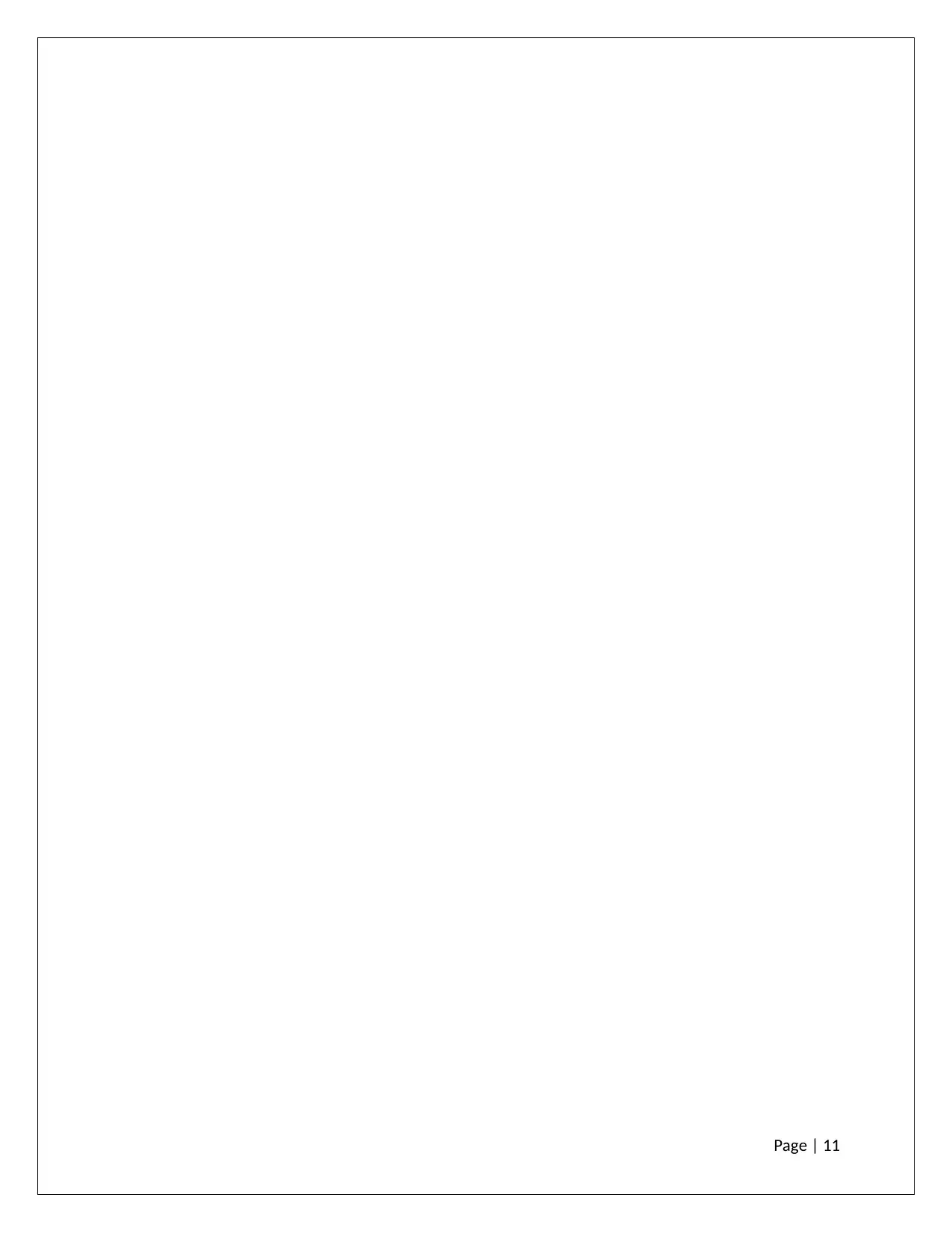
Page | 11
⊘ This is a preview!⊘
Do you want full access?
Subscribe today to unlock all pages.

Trusted by 1+ million students worldwide
1 out of 14
Related Documents
Your All-in-One AI-Powered Toolkit for Academic Success.
+13062052269
info@desklib.com
Available 24*7 on WhatsApp / Email
![[object Object]](/_next/static/media/star-bottom.7253800d.svg)
Unlock your academic potential
Copyright © 2020–2026 A2Z Services. All Rights Reserved. Developed and managed by ZUCOL.




